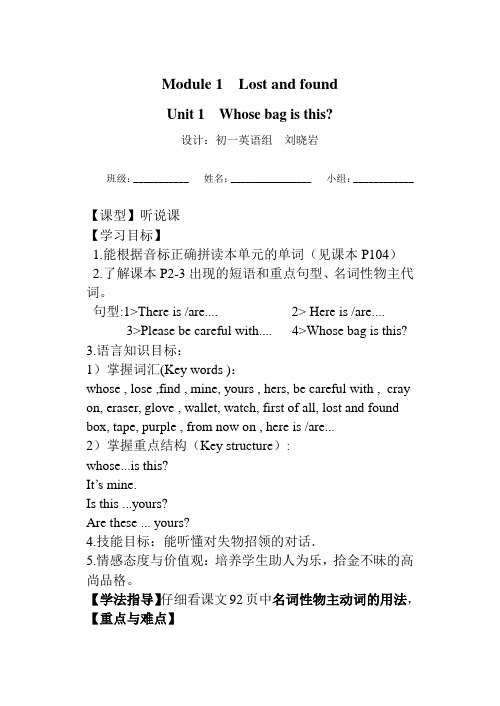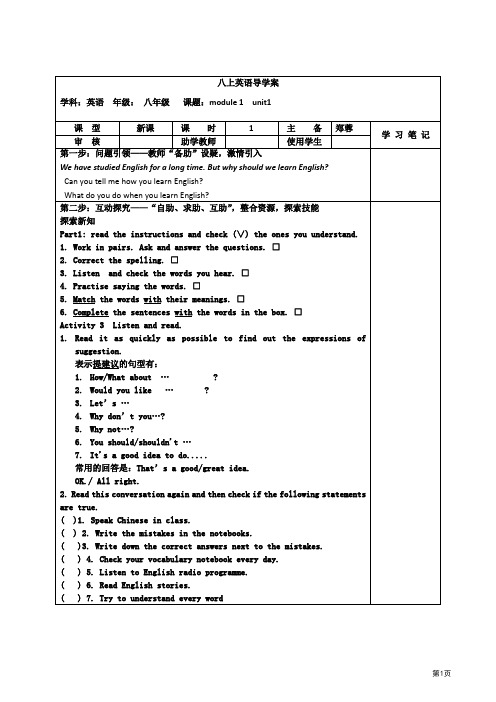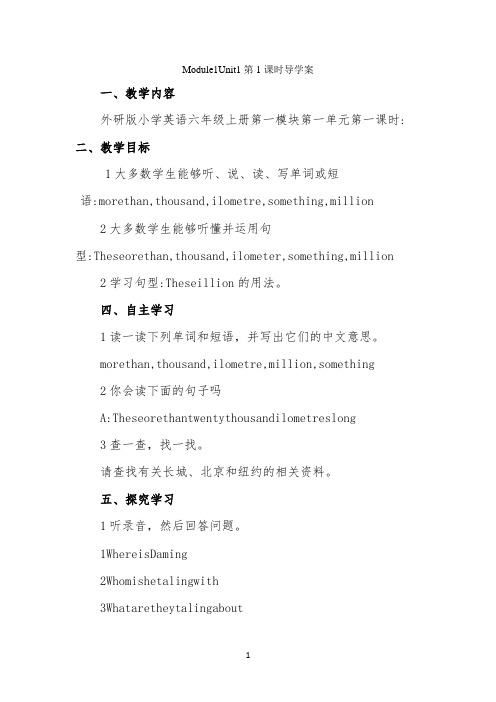《Module1_Unit1》导学案
Module 1 unit 1 导学案

Module 1 Lost and foundUnit 1 Whose bag is this?设计:初一英语组刘晓岩班级:___________ 姓名:________________ 小组:____________【课型】听说课【学习目标】1.能根据音标正确拼读本单元的单词(见课本P104)2.了解课本P2-3出现的短语和重点句型、名词性物主代词。
句型:1>There is /are.... 2> Here is /are....3>Please be careful with.... 4>Whose bag is this?3.语言知识目标:1)掌握词汇(Key words ):whose , lose ,find , mine, yours , hers, be careful with , cray on, eraser, glove , wallet, watch, first of all, lost and found box, tape, purple , from now on , here is /are...2)掌握重点结构(Key structure):whose...is this?It’s mine.Is this ...yours?Are these ... yours?4.技能目标:能听懂对失物招领的对话.5.情感态度与价值观:培养学生助人为乐,拾金不昧的高尚品格。
【学法指导】仔细看课文92页中名词性物主动词的用法,【重点与难点】1.名词性物主代词2.名词性物主代词和形容性物主代词的差异3.元音字母a在单词中的读音。
【课前预习】(一)完成课文p2-3的相应习题。
(二)英汉互译1. 钱包________2. 橡皮擦________3. 谁的________4. whose_______5. 失物招领箱_____ _____ ______ ______6. 我的(东西)________7. 从现在开始_______ _______ _______8. 你(们)的(东西)________ 9. 她的(东西)________【思考,小组讨论,合作探究】:1.welcome back to school(英译汉)____________________ back是“________”的意思“欢迎某人来某处”用be welcome to +地点名词*【不能用welcome sb to some place】例如:欢迎你来我北京(或北京欢迎你)正:(You are ) welcome to Beijing. 误:Welcome you to Beijing.[知识链接]“欢迎某人做某事”可以说sb. is welcome to do sth,但不可以说welcome sb. to do sth。
Module 1 Unit 1 导学案

.write to sb给某人写信
•agree with sb。同意某人
Do some exercises:
1. Fill in the blanks:
(1) She should(go) to school early.
(2) Why don’t you(play) basketball?
Can you tell me how you learn English?
What do youdowhen you learn English?
第二步:互动探究——“自助、求助、互助”,整合资源,探索技能
探索新知
Part1:read the instructions and check (∨) the ones you understand.
(3) How about(eat) noodles?
(4) There are five(mistake) in your homework.
(5) She is going to(help) his father.
(6) It’s a good idea to(get) up early.
(7) He(play) football very well.
1. A: Do you like English?
B: Yes, why?
A: _______ listen to an English song after class!
B: ________.
2. A: What are you going to do this evening?
B; I think I will stay at home.
2022年外研版九上《Module 1 Unit 1(导学案)

Module 1 Wonders of the worldUnit 1 It’s more than 2,000 years old.一、学习目标:目标A:认读、理解本课的词汇及短语.目标B:听懂对话大意.目标C:学会带感情地朗读与断句.目标D: 通过对话学会向别人介绍景点.二、问题引领问题A:认读、理解本课的词汇及短语. 〔检查预习内容:翻译重点短语. 1、师友互查重点短语翻译, 学师帮学友纠正发音. 2、抢答环节:抢答翻译以下重点短语〕1. 超过, 多于______________2. 自然奇观___________________3.最神奇的______________________4. 同意某人的意见___________________5. 它们中的大数___________________6. 依某人看来___________________7. 数以百万的__________________问题B:听并完成各项任务〔速读题干, 预测听力内容, 带着问题去听. 〕1. Match the names of the wonders with the pictures on the right and on the next page.Try to read the names of the wonders.2. Look at the pictures and answer the e the words in the box to help you.问题C:听读对话, 完成任务并跟读模仿.1. 听Activity 3, 完成以下任务.1) What are they mainly talking about? ( ) A. Natural wonders B. Man-made wonders C. Both A and B2)In Betty’s opinion,_________ wonders are more exciting than _______ ones.3)Is the Three Gorges Dam a natural wonder or a man-made wonder_________________________.Tony advised his friends ___________ Wonders of the World and joined ____ the discussion. He thought natural wonders ______more interesting than man-made ones. He also thought the Giant’s Causeway was the ______ fantastic natural wonder.But Lingling wasn’t _____ about it. Because she has never ________ it. She thought Victoria Falls in Africa was _____ more fantastic. It’s about 1,700 metres wide and 100 metres high.That’s huge. However Betty and Daming didn’t agree ______ Tony and Lingling. In ________ opinion,man-made wonders are more exciting ______ natural ones, such as the Terracotta Army、the Three Gorges Dam.三、训练2.用所给词的适当形式填空1) I _____ never _______(be) to America.So I know nothing about it.2) In ______(they) opinion, they should study in groups and help with each other.3) Man-made wonders are ______ (excite)than natural ones.4) Spring is a ____________(wonder)season and every thing comes to life.5) I’m ready for it. I ________(write) down the ideas in the notebook.3.句型转换1) The hole is about 20 metres deep(対画线局部提问). _______ _______is the hole?2〕Let’s go there and join in the discussion.(改为同义句)Let’s go there and _____ _____ ____ the discussion.3〕I’ll write down some ideas about the natural wonders.(用already 改写句子)I ______ already _______ down some ideas about the natural wonders.4〕Though he is very young, he knows much knowledge.(改为同义句)He is very young,________ he knows much knowledge.5〕There are more than two thousand students in our school.(改为同义句)There are ______ two thousand students in our school.4.根据汉语意思完成句子.1)他邀请我们参加讨论. He invited us to ____ ______ the discussion.2)我不同意你的观点, 我有更好的方法. I don’t _______ ________ you and I have better ideas.3)在我看来, 那个故事的结局并不完美. ___ _____ _______, the ending of the story is not perfect.4)那些书花了我200多元. Those books cost me _____ ______ 200 yuan.5)我已经给迈克写过信了, 但是我还没有把它寄给他.I _____ already ______ letter to Mike, but I _____ _______ it to him.Unit 1学习目标一、掌握本单元including, attend, whatever, give up等单词和短语. 〔重点〕二、掌握并灵活运用以下句子:〔重点〕1. Whatever she does , she never give up !2. That’s amazing.三、听懂有关英雄人物的对话并能流利地介绍自己喜欢的名人.自主预习新词自测读写单词或短语并熟记看谁记得快.1.包含;包括prep.2.出席;参加v.3.在国外;到国外adv.5.不管怎么样conj.7.意志;决心n. 8.获胜;胜利n.9.实在;确实adv. 10.惊人的adj.课堂导学1. Whatever she does , she never give up .无论她做什么, 她从来都不放弃.单词1:Whatever 无论什么;不管怎么样Whatever作连词, 意为“无论什么;不管怎么样〞, 在本句中引导状语从句. whatever相当于no matter what, 还可以引导主语从句, 也可引导宾语从句.happens , stay calm.不管发生什么情况, 保持镇静.归纳:类似whatever的词还有:wherever无论在哪里, however然而, whoever无论, whenever谁无论何时等. You can go wherever you like.你可以去你喜欢的任何地方Whoever comes will be welcome.不管谁来都欢迎短语1:give up放弃give up, 意为“放弃〞, 后接名词、代词或动名词作宾语. give up为动副结构的短语, 当宾语为代词时, 代词要放在短语中间.Tom isn’t good at math , but he won’t汤姆不善长数学, 但他不会放弃数学的To keep healthy , you should smoking要想保持健康, 你应该戒烟即学即练一一、单项选择- Why did your uncle finally such a good chance to work abroad?- Because he wanted to do more for our country.A. look upB. make upC. give upD. use up二、按要求完成句子改为同义句.Whatever he says , she will agree with him (改为同义句)he says , she will agree with him.2. Well, I think she’s a good student as well as a good player.嗯, 我认为她不仅是一名优秀的运发动, 而且还是一名好学生.短语2:as well as 也;不仅……而且……as well as, 意为“也;不仅……而且……〞, 常用来连接两个并列的成分, 强调as well as前面的内容. as well as连接两个名词、代词等作主语时, 谓语动词跟as well as前面的词在人称和数上保持一致.Bob can speak Spanish English.鲍勃不仅会讲英语, 也会说西班牙语.提示:as well as和not only…but also…同义, 但前者的语意重点和后者的语意重点恰好相反.Jennifer can sing as well as dance. 〔强调唱歌〕珍妮弗不但会跳舞, 也会唱歌.Jennifer can not only sing but also dance.〔强调跳舞〕珍妮弗不但会唱歌, 也会跳舞.即学即练二一、单项选择The mother, as well as her two daughters, to the theatre with some friends this evening.A.are goingB.were goingC.is goingD.was goingUnit 2学习目标一、掌握本单元sick, treat, manage, die for , take care of , on one’s own等单词和短语. 〔重点〕二、看懂介绍白求恩的文章并能就自己所学所知写一篇类似的短文.自主预习一、新词自测读写单词或短语并熟记, 看谁记得快.1.加拿大的;加拿大人的adj.2.士兵n.3.伤;伤口n.4.为……而死5.了解;意识到v.6. 垂死的;即将死亡的adj.7. 那时候8. 创造;创造n.9. 做成;〔尤指〕设法完成v.10. 〔使〕继续v.二、用所给词的适当形式填空1. Dr Bethune is one of the most famous (hero) in China.2. He often worked very hard without (rest) or (take) care of himself.3. Once , he managed (save) over a hundred lives.课堂导学1.Dr Bethune developed new ways of taking care of the sick.白求恩大夫开发了新方法来照顾病人.短语1:take care of照顾;护理take care of, 意为“照顾;护理〞其中care为不可数名词, 前面不用冠词修饰. 此短语后面可接名词或代词作宾语, 其同义短语为look after.She stayed at home and her mother yesterday.昨天她待在家里照顾她母亲.短语2:the+形容词某一类人或事物句中the sick, 意为“病人〞. 定冠词the与形容词连用, 表示复数意义的“某一类人或事物〞. 当这种结构作主语时, 谓语动词用复数形式.need us to care about them.盲人需要我们关心他们即学即练一一、单项选择young will like this kind of sport , but old will not.A. A;aB. A;theB.The ; aC. The ; the二、根据汉语意思完成句子当我不在家时, 照顾好你自己.When I’m out , yourself.2. At that time, there were few doctors , so he had to work very hard on his own.那时候, 那儿几乎没有医生, 所以他得努力地单独一人工作.短语3:at that time那时候at that time是固定词组, 意为“那时候〞, 常用于过去时或过去进行时的句子中.She was 86 . 那时她86岁.He was sleeping . 他那时正在睡觉短语4:on one’s own单独一人on one’s own, 意为“单独一人〞, 还可表示“靠自己;独立地〞, 一般用作状语, 相当于by oneself或者alone. Although her father is in the company , Mary got the job 尽管她父亲在这个公司里, 但玛丽是靠自己得到那份工作的.We should do our own things 我们自己的事情应该自己做.即学即练二一、单项选择- What were you doing when I called at 8 p.m. yesterday?- I the piano at that time.A. playB. is playingC. playedD. was playing二、根据汉语意思完成句子学生们应该独立完成他们的家庭作业.Students should finish their homework .3… and managed to save over a hundred lives.……设法挽救了一百多条生命.单词1:manage .做成;〔尤指〕设法完成manage作动词, 意为“做成:〔尤指〕设法完成〞, 其后可接名词、代词或动词不定式, manage to do sth.意为“设法做成某事〞. manage作动词, 还可表示“管理, 经营, 控制〞等后接名词或代词.We the work ahead of time.我们设法提前完成了工作She the shop while the owner was away.店主不在的时候她照管商店即学即练三根据汉语意思完成句子最后警察设法抓住了那个小偷.At last , the policeman the thief.4. In the end , he died of his wound.最后, 他因他的伤口〔感染〕而死.短语5:die of 因……而死, 死于……die of, 意为“因……而死. 死于……〞, 原因常来自内部, 后常接hunger, illness , cancer ,sorrow等名词. Steve jobs illness on October 5, 2021 .史蒂夫乔布斯于2021年10月5日因病逝世.Every year , nearly one million people hunger.每年约有一百万人死于饥饿.拓展:die from的用法die from, 意为“死于……〞原因常来自外部, 由环境造成〔主要指事故等方面的外部原因〕, 后常接accident , overwork , drinking , smoking等名词.即学即练四一、单项选择My grandma died cancer.Unit 3学习目标掌握原因状语从句目的状语从句和结果状语从句的用法. 〔重点〕Many people were dying because they did not get to hospital quickly enough.There were few doctors ,so he had to work very hard on his own.He wrote books so that they could about how he treated the sick.自主预习从方框中选择适当的连词完成句子1. I didn’t know which dictionary was better , I took neither.2. Traffic is heavy and the price of oil is much higher, many people go to work by bus instead.3. Both of his parents work in the city . he lives with his grandparents in the village.4. The teacher speaks loudly the students can hear her clearly.5. If you go to visit London , don’t forget your umbrella it rains a lot there .课堂导学On 12th April 1961, Gagarin took off for space .1961年4月12日,加加林乘宇宙飞船飞往太空.短语1:take off 〔飞机等〕起飞take off是动词短语, 意为“〔飞机等〕起飞〞, 反义词是land. 它还可表示“脱下;取下〞, 反义短语为put on. When will the plane ?飞机何时起飞He his raincoat and took out the key.他脱下雨衣, 拿出钥匙.注意:take off是由“动词+副词〞构成的短语, 当其后接代词时, 代词要放在take和off的中间. 当其后接名词时, 名词放在off的前后均可.Put on your clothes . Don’t take them off.把你的衣服穿上. 别脱下来.即学即练一、单项选择Attention please . The plane will in five minutes.A. take outB. take afterC. take offD. take care二、根据汉语意思完成句子这个人脱下他的毛衣, 出去了.The man his sweater and went out .语法规律总结原因、结果和目的状语从句.1.原因状语从句〔1〕because引导的原因状语从句because作连词, 意为“因为〞, 表示必然的因果关系, 语气较强, 通常放在主句之后, 假设需强调那么放在主句之前, 常用来答复疑问词why提出的问题. because引导的原因状语从句有时可与because of短语换用. because和so在一个句子中不能同时使用.I went to see a doctor because I had a cold.我去看医生, 因为我感冒了.-Why are you anxious?-为什么你很着急-Because my bike is broken.-因为我的自行车坏了.(2) since引导的原因状语从句since, 意为“因为;由于;既然〞, 侧重主句, 从句表示显然的或的理由, 常放在句首.Since we are young , we shouldn’t be afrai d of making mistakes.既然我们还年轻, 我们不该害怕犯错误.2.结果状语从句so常用来连接并列句, 前一分句表示原因, 后一分句表示结果. so和since不能连用.They worked very hard , so they could finish the work before supper.他们拼命地干活, 所以在晚饭前就能把工作做完.It is very cold outside ,so I wore a heavy coat.外边很冷, 所以我穿了一件厚大衣.3.目的状语从句so that 引导的目的状语从句中通常带有can , could , may , might ,should 等情态动词. so that引导的从句在主句后, 从句前不用逗号, 有时可省略that.I will tell you all the facts so that you can judge for yourself.我会告诉你所有的事实以便你可以自己判断.即学即练用so, so that , because , because of 填空1. This meal is my treat , put your money away.2. I get up early I can do some exercise.3. I didn’t eat the fish the smell was terrible.4. David didn’t go to school his illness.。
Module1 Unit1 第1课时导学案

Module1Unit1第1课时导学案一、教学内容外研版小学英语六年级上册第一模块第一单元第一课时:二、教学目标1大多数学生能够听、说、读、写单词或短语:morethan,thousand,ilometre,something,million 2大多数学生能够听懂并运用句型:Theseorethan,thousand,ilometer,something,million 2学习句型:Theseillion的用法。
四、自主学习1读一读下列单词和短语,并写出它们的中文意思。
morethan,thousand,ilometre,million,something2你会读下面的句子吗A:Theseorethantwentythousandilometreslong3查一查,找一找。
请查找有关长城、北京和纽约的相关资料。
五、探究学习1听录音,然后回答问题。
1WhereisDaming2Whomishetalingwith3Whataretheytalingabout4TheycanseetheGreatWallintheing:Canyoutellmesomethi ngaboutNewYorHowbigisitSimon:It'Daming:ThatisbigSimon:HowbigisBeijingDaming:Beijinghasgotabouttwentymillionon:Wow!That’sreallybig!1IsNewYorbig2Howmany_lli_n3s_m_thing2根据句意和首字母补全单词。
1This em abouttheanimals3小蝌蚪找妈妈。
找出对应搭配国家名。
1theGreatWall 2NewYor4用英语回答。
1HowlongistheGreatWall?2WhereisNewYor?七、课时小结1.这节课我的收获是:2.这节课我的不足是:Keys一、自主学习:1更多的,千,公里,百万,某事物。
Module 1 U1导学案

Module 1 We lived in a small house.1.同学们,去年学过的过去式还记得吗,让我们一起来回忆一下吧!live_____ can_____ do_____ are_____ watch______ have_____ is______ talk_____ cook____2.看图完成句子许多年前There _________________. There_______________. There ______any buses.3.阅读课文,回答问题。
a. What are Amy and Lingling doing ? _____________________________________c. What are they talking about on TV?___________________________________4.完成表格5.看看下面几幅图画,比较一下现在的生活与以前的生活有什么不同?看出以前的生活与现在的生活有什么不同了吧,试着用there be 句型表示一下吧,There is\are……There was\were……________________________________________________________________6.火眼金睛辨真伪。
It’s a programme about China. ( )There were many buses. ( )There weren’t any televisions. ( )The old lady lived in a small house. ( )There are lots of cars and buses now. ( )中国家庭的变化在过去,中国的家庭总是很差,很多孩子加生活很贫困。
他们没有足够的食物,他们往往遭受饥饿。
而更糟糕的是,他们生病的时候不能得到及时治疗。
外研英语六年级上Module1 Unit1优秀导学案

五.Homework
1、Recite sentences and copy.
2、Read the text.
一、Talk about the study
Talk about the city
二、presentation
1、学生读并且用句型说话:
1)We’re happy !
Yes ,we are .
Our study is very happy !
2)Tell me more about Pengshan .
3)Is it big ?
No, it’s small
4)How long is the Minjiang River ?
It’s about one thousand and two hundred seventy-nine metres long .
B、Yes ,these are
C、Yes ,they were
四、Summary
学生试着总结本课知识点,老师补充。
1、关于How long/How big句型
2、关于宾格
we-us they-them
I-me she-her
3、关于专有名词
4、关于数字
hundred thousan million
1、教师呈现重点句型。
1)These postcards are great!
Yes, they are .
2)Tell me more about the Great wall.
3)Is it +形容词?
4)How +形容词+is it ?
三.Practice
1.Teacher guide and explain
Module 1Unit 1导学案英语八年级上册
Module__1__Unit___1__(第__2__课时) 导学案年级: 班级: 姓名:一、学习目标:1. 复习第一课时内容。
2. 学会使用language points。
3. 能顺利完成达标检测内容。
学习内容一、翻译下列短语:1.犯错2.写下3.同意某人4.给某人一些建议5.为何不做某事6.让我们一起做某事7.好主意8.不要忘记去做某事9.正确的答案10.别的什么事11.听收音机12.最好不要去做某事13.不必去做某事14.一样重要15.彼此写信二、完成句子:1. 我将给你们一些学英语的建议。
I’m going to __________________ about studying English. 2. 课堂上你应该总是说英语。
You _________________ English in class.3. 我和我的笔友互相发电子邮件。
My pen friend and I ______________ each other.4. 不要忘记每天检查你的词汇本。
__________________ your vocabulary notebook every day.5. 尽量不要逐字翻译。
_________________ every word.6. 为什么不把你的正确拼写写在错误旁边呢?__________________ the correct spelling next to the mistakes?7. 你还想知道别的什么事?_________ do you want to know?8. 我完全同意你的意见。
I quite __________ you.9. 我认为写与读一样重要。
I think writing is _____________ reading.注:其他练习内容见本课课件12。
高中英语导学案必修一Module 1 Unit 1
Part 1:skimming :Skim the two articles on page18, and answer the question below.1. What are the two clubs in the articles?2 .The two articles are written to___.A. introduce why school clubs should be runB. tell us reasons why they start their school clubs.C. explain the importance of running their own clubs.D. give you some ideas of what school clubs are likeScanning: Answer the following questions.Part 2:scanning Passage A: Questions1.What is the name of the club?2. Who runs it?3. When was it started?4. Why was it started?5. What does the club do?●Every morning:●During the exam time:●At the end of the school year:●When parents come:6.From the first article by Kate Jones, we can learn that____A. what the radio club does is only to play music during break time.B. the club is supported by the school but is run by teachers.C. the club allows any student to give messages to their parents who come to visit the school.D. Kate has very good feelings for her club.Passage B1.What’s the name of the club?2.Who started it?3.When do the members meet?4.Why was it started?5.What do the members do?6. Every time members of the poem club meet, they_____A. sit down under a tree.B. talk about the poems and poets they like.C. read poems about nature.D. write a poem and read it to the group.True or False1.The radio station is run by the principal.2.The radio station started 2 years ago because Kate Jones wanted to play musicduring break times for everyone.3. Members of Poets of the Next Generation meet up on the last Friday of every month.4. Everyone was nice and friendly in the group. They liked the first poem Bob read to them.Cloze test: Passage 1.The radio station in our school is run ____ the students. I am lucky ____ I am one of the hosts.We tell students the weather, recent news and some special messages. ______ exam time we have a special programme ____________ tells students what they should do for preparation. When parents come, we play songs sung by students and inform them __ events such as outings and school plays.Passage 2.Our school club “ Poets of the Next Generation” is a literary club _____ was started by our English teacher Mr Owen .We meet to talk about poems and poets ______ we like.______ I attended it, I was required to write a poem and read one to the group. I gathered everyone ____ a tree before I read. The group said ___ was one of the best compositions I read.Language points Page 181. 创办一个俱乐部2. 在休息时间3. 负责4. 远远不仅仅5. 在考试期间6. 给某人传递信息7. 通知某人某事8. 文学俱乐部9. 挑选诗歌10. 参加第一次会议11. 停止担心12. 一首关于自然的诗Page 19 17 签名13 做研究14 提出15 利用16 根据Key words1. approve 赞成,同意;批准,核准,对…表示认可approve a plan/ bill 批准一个计划/法案approve of 赞同,支持某事approval . n.赞成,批准你的决定很棒,我完全支持你。
Module1Unit1导学案外研版英语八年级下册
Module 1Feelings and impressions◎知识导航主题语境:人与自我子主题:做人与做事、情绪与情感1.语言知识:熟悉、使用感官动词和形容词。
2.文化知识:学会如何与陌生人交流,增强自信。
3.语言技能:通过听说读写,能够描述食物、人物形象和主观感受。
4.学习策略:能听懂对物品和人物的描述,并能简单描述个人爱好和感受。
Unit 1It smells delicious.课型:听说课◎预习试炼请预习下列重点单词、短语和句子,并完成下面的表格及相关训练(标•的为重点单词拓展内容)。
单词和短语重点单词名词1.小甜饼;曲奇饼cookie•(pl.) cookies2.比萨饼pizza•(pl.) pizzas3.尝试;努力try•(短语)尝一尝;试试看have a try•(v.) 尝试try•(短语)尝试做某事try doing sth.•(短语)尽力做某事try to do sth.4.馅饼;派pie•(短语)苹果派apple pie5.盐;食盐salt•(adj.)咸的salty6.果酱jam•(短语)交通堵塞traffic jam7.最喜欢的人或事favourite8.耳朵ear•(短语)一只耳朵an ear动词9.听起来;令人觉得sound•(n.)声音sound 形容词10.软的;柔软的soft• (反义词)硬的hard11.酸的;馊的sour根据语境或提示,完成填空。
1. The dish (闻起来) delicious. It must be nice to taste.2.I would to go to movies tomorrow.3.We should eat less (盐) every day if we want to stay healthy.4.Children like (曲奇饼) better than cakes.5.The silk feels s and comfortable.6.The tea is (做完了).Help yourself, please.7.My pet cat is so (可爱的) that we all like it.8.The milk smells s,and just throw it away.9.Everything is possible. Please just have a t.10.Doing sports is always my ,because it makes me happy and strong.佳句仿写请在教材中标出下面句子,并用句中黑体词或短语仿写句子。
外研版(三起点)六年级上册Module1_Unit1_第1课时导学案
Module1 Unit1 第1课时导学案一、教学内容外研版英语六年级上册第一模块第一单元第一课时: Unit 1 1. Listen and chant. 2. Listen, read and act out.二、教学目标1. 大多数学生能够听、说、读、写单词或短语: more than, thousand, kilometre, something, million.2. 大多数学生能够听懂并运用句型: These postcards are great! It’s a picture o f the Great Wall. Tell me more about... It’s...谈论某个地方或某个事物的情况。
3. 能够运用所学的语言知识与同伴进行交流。
三、教学重难点〔一〕重点:1. 听、说、读、写单词和短语more than, thousand, kilometer, something, million.2. 学习句型: These postcards are great! It's a picture of the Great Wall. Tell me more about... It’s...〔二〕难点:1. 运用句型: These postcards are great! It’s a picture of the Great Wall. Tell me more about…It’s…谈论某个地方或某个事物的情况。
2. thousand, million的用法。
四、自主学习1. 读一读以下单词和短语,并写出它们的中文意思。
more than, thousand, kilometre, million, something2. 你会读下面的句子吗?A: These postcards are great!B: Yes, they are.A: Tell me more about the Great Wall. How long is it?B: It’s more than twenty thousand kilometres long.3. 查一查,找一找。
- 1、下载文档前请自行甄别文档内容的完整性,平台不提供额外的编辑、内容补充、找答案等附加服务。
- 2、"仅部分预览"的文档,不可在线预览部分如存在完整性等问题,可反馈申请退款(可完整预览的文档不适用该条件!)。
- 3、如文档侵犯您的权益,请联系客服反馈,我们会尽快为您处理(人工客服工作时间:9:00-18:30)。
Module1 Unit1 I want a hot dog , please.
导学案
一、学习目标
1、能听、说、读、写本单元的单词hamburger /cola /cent /d ollar和句型What d o you want ? I want ……
2、能听懂会说:“What d o you want ?I want ……
How much is it ? It’s …”等句子。
3、能会用英语在快餐店点餐。
4、能够用英语讨论点餐和就餐的情况。
二、听读教材P2-3.结合课件把重点单词及短语标出来。
预习学案:
一、自主学习并翻译下列单词和短语:
hamburger ___________cola___________ cent ___________ d ollar__________
热狗 ______________ 三明治_____________ 橘子汁______________ 请用餐____________________ 13.25 美元______________________
二、导学:
翻译句子:
I want an ice cream.
Can I help you ?
How much is it ?
知识集中营
课堂检测内容:
一、根据汉语提示写出单词。
1、It ________(看起来) good.
2、I want a _________(汉堡包),pl ease.
3、Please ________(享用)your dinner.
4、The ________(一餐) is very d elicious .
5、One _______(美元) is about seven yuan .
二、用括号内所给词的适当形式填空。
1、I want a hot d og and he _____(want) a hot d og , too.
2、-What d oes she _____(want)?
-She ______(want) some rice.
3、We want _______(eat) some fish and chips.
4、Is it _______(real) a dog?
过关检测(合上课本试着回答)
A: Can I help you?
B: Yes. I ___ a hot d og,pl ease.
A: What d o you___to drink?
B: I____a cola.
How ____ is it?
A: It’s five d ollars and fifty cents. B: Here ___ ___ .
A: Thank you. ___ your meal!。
